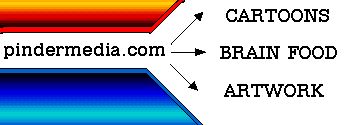

|
|
 |
 |
cyberbarf
EXAMINE THE NET WAY OF LIFE
Pop the Weasel
by Paul C. Pinderski
America Online has had a rollercoaster ride since its merger with Time-Warner. The synergy of old media and new media has left investors with queasy uncontrollable projectile vomiting attacks at the mere whisper of AOL. Take the biggest internet service provider, the new distribution channel, and take the content from the vast empire of Time-Warner, the old economy royalty machine, and the new company would be printing money as fast as the U.S. Treasury.
Still, thirty five million subscribers call AOL their start-up gateway to the net. But most are not flocking to the Time-Warner archive content. The reasons for service providers are simple: was it in the PC box preloaded? is the flat fee for unlimited time a price point deal? does the email work?
On the average day, what do I use AOL for? Checking emails and checking stock portfolio prices. For news, information, research and surfing, I use another service. The main screen and format of AOL is basically lowest common denominator bland and uninteresting. But it hangs around because it was one of the first industry giants to get people to venture out on their modems. AOL is the like the crazy relative that is living up in the attic. It has been around along time, it was choice by default for many users. My first provider, Apple's eWorld, imploded and sold customers to AOL in the heady day of rounding up users like stray mustangs in the southwest in 1850. Once roped, fairly well corraled subscribers did not migrate. I am too busy and too lazy to constantly change email addresses and notify the world of the change. We all know people who change email addresses more than changing socks.
On October 16, 2002, AOL announced that it was dropping third party pop-up ads. It is part of a new plan to get back to basic customer service. Imagine. Basic customer service. AOL grew rapidly to 35 million subscribers not because of pop-up ads, but as a heavily self-promoted, easy gateway for the novice Internet user. Microsoft's MSN network is a distant second choice. Both browsers are upgrading and attempting to capture or keep their subscribers.
Earthlink had already given its users an option to block annoying pop-up ads. Pop-up ads are a nuisance; screen graffiti. It usually slows down your window; but if you use it at as an arcade practice session, you can quickly close the box before it fully loads.
Pop-ups are only part of the problem. The pop-under ads are just as annoying; they take up more space, and eat memory. There are times searching and hyperlinking to other sites that build a stack of windows when the browser bleats a dire warning that it is running out of memory. It is annoying to dig under the desktop to close all those unwanted ads to regain some memory to continue surfing. Anything to stop the slowdown of gathering information is a good thing. Greatly appreciated.
If AOL is to begin to listen to their subscribers, it may start with re-tooling its content. By contrast with other providers, it has become fairly stale in appearance and depth. Take the time and effort culling those pop-up ads and refocus to why AOL started the service in the first place. Oh, that is too grand a vision, for the press release clearly does not state that AOL itself will be banning pop-up ads. Maybe this is a clever way of charging more for less of them. Maximizing the pop, so to speak.
The Weight of Education
by Paul C. Pinderski
Oh. Ow. Groan. The gross weight of education is hurting the children.
It's the textbooks. The crammed backpacks of high school and college students are creating a generation of hunchback scholars. Low back pain and curvature of the spine are increasing signs of this weighty problem. The states of New Jersey and California are considering maximum textbook weight! Just like interstate truck weights and measures! Are state troopers with portable scales going to take over hallway monitor functions? And who would they ticket for any weight violation? The student? Their parents? The textbook publisher? This leads to an endless tangent of cesspool litigation thinking to extract money for the cash starved public school system.
The educator's solution is to give all the students computers and e-books. A computer is lighter than a day's coursework, the theory goes. In reality, it is another ploy to double the cost-per-pupil taxpayers will have to fund to their local schools. Look at the cost, $1,500 per student, plus the cost of Internet access to get their assignments, download e-book or tests; where is the high speed access to have an entire school boot up to begin class at 8 a.m. each day?
A lightweight laptop is no guarantee that any student will get more knowledge than reading the pages of a textbook. It only guarantees school administrators with another large budget and bidding item. It gives students more of a temptation to cut and paste their way through their homework in time to chill the evening away multitasking hip-hop on the iPod; watching MTV and playing a gameboy on the side. The net is filled with term papers readily available to be culled into a quick B on the report card. One teacher found out this when he began reading reports, and after the first few students, he found that three were exactly the same; and others had huge blocks of the same text.
Is not part of the educational experience, the grit and grind of opening the musty pages of a life science textbook, circa 1968, and read about Life like your parents had? Everyone should have the shared cultural experience of going to the textbook library and balance like a circus performer the dozen hardcover textbooks on the way across campus to the dorm. Arms aching, sweaty brow; throw the books in the corner and pop an cool beverage. At the end of the semester, you can count how many volumes never left the original prone position while you re-pile them on the long sojourn back to the textbook library return counter.
Textbook publishers offer a common sense solution. Put the lockers back in the hallways, and give kids time between class to get their books. However, a common sense solution has no place when the health of America's children is involved, especially in the public schools.
This is just another issue that detracts from the real problems in the public schools: declining basic comprehension skills; merit testing for teachers; cumulative testing for graduation. Educators should be more concerned that their charges are able to read the paper textbooks than how much the books weigh.
Also, was not the whole point of physicial education to strengthen the hearts and minds of the children so they can get through the tough days of real life after graduation?
RUB! RESET! CLEAR!
by Paul C. Pinderski
Rub the paddles. Reset the machine. Yell, CLEAR! ClickTHUD!
Look to see if the flatline has changed.
Most of the high flying Internet companies of the go-go 1990s are dead. Billions in market capitalization vaporized, like the vaporware business plans that investment bankers were drooling over in preparation for that next mega-IPO.
American Online has been cobbled together has a monolith corporation. It is a Frankenstein, a groaning hulk in search of clarity or purpose. The main reason for the megamerger, the joining of the Internet with the Time-Warner content archives, has failed to produce the excitement or the revenue growth. The business model comparisons to that of television was totally puffed by a bubble stock market, an infant medium, and fickle, independent, young, web surfers. AOL is trying to find a way to exit the cross-media sinkhole of red ink. Rumors continue to surface that AOL-TW wants to spin-off its news operations with ABC. A combined CNN-ABC News may have revenue numbers, but it may not have any profits. The network culture of the old Big Three was that the news divisions were prestige and public service and lost leaders (except for local newscasts at O&O stations). Can entire operation of diverse media groups operate effectively? The corporate cut-backs of AOL on CNN have lead to legendary disgruntled employee emails. How many talking newsheads can one media monster handle?
Disney threw billions at its Internet news and content sites in the past. It has now written off those billions in Internet properties. Major media companies have been trying to pound their traditional signal content onto the average computer screen. But the mainstream problem has been streaming content. The quickness of television and cable to pop up a newscast video is easy compared to formatting and uploading similar video news on a website. Viewers on the web find most connection speeds less than DSL so they don't seek out web news sites as being primary source for video stories. Media companies have not quite got around to mastering the text, graphics and interaction which are the strengths of web programming.
Disney got out of the Internet search and portal business. It arrived late and did not integrate the Go! It's long gone. Yahoo is still king of the this hill. But Microsoft has plenty of cash to throw around. So Disney goes to Internet plan B by signing a marketing-content agreement with MSN. Microsoft grafting the Disney trademarks onto the MSN home page will not guarantee success.
The audience is present for a success story. Newspaper circulation is literary dying off. Television news ratings are declining into fragmented pockets. Generations X and Y are spend more collective time doing other things, including web hopping, than absorbing information from the network news groups. By default, more people are getting their news, their view of what is happening in the world, from their computer screens. The marketing and demographics departments of Big Media know that this trend has to be captured soon. And that could be frightening-- like the Bride of Frankenstein.
COMING SOON
descendingspiral.com
Distribution ©2001-2002 pindermedia.com, inc.
All Rights Reserved Worldwide.
Contact Information
Terms and Conditions
Trademarks
Archives
T-Shirts, Caps, Mugs. Check for Specials!